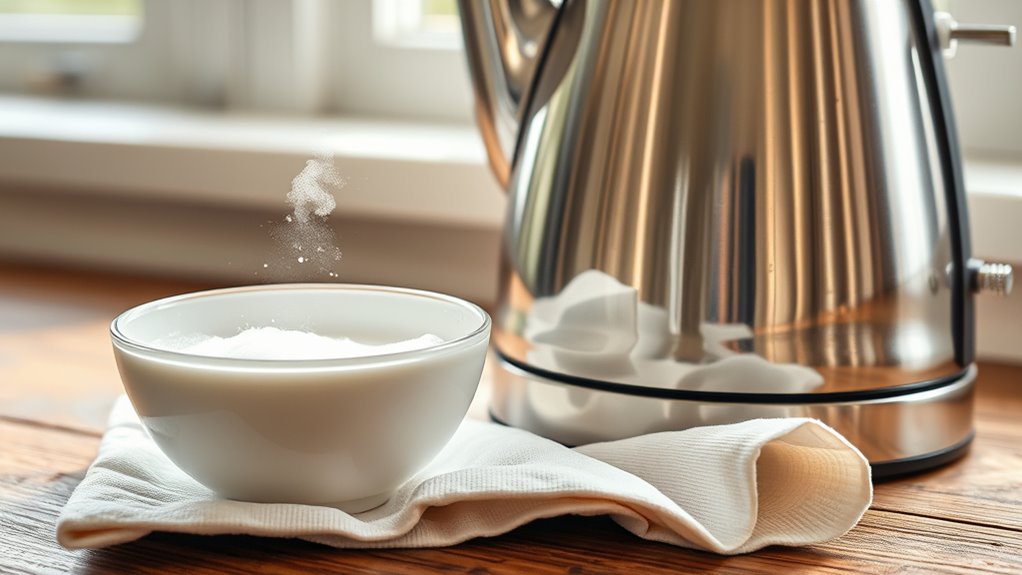To descale a kettle effectively, start by recognizing signs like slower boiling or chalky deposits inside. Use natural solutions like vinegar or lemon juice mixed with water, boil, then soak, rinse thoroughly, and wipe clean. For tougher buildup, commercial descalers work quickly. Always follow manufacturer instructions, avoid overfilling, and dry after each use. Proper maintenance prevents future scale, and if you want to master the best techniques, there’s more to discover.
Key Takeaways
- Use natural solutions like vinegar or lemon juice mixed with water for safe, eco-friendly descaling.
- Boil the descaling mixture in the kettle, then let it soak to loosen mineral buildup effectively.
- Rinse thoroughly with fresh water after descaling to prevent lingering flavors or residues.
- For heavy deposits, commercial descalers may be more effective, but always follow manufacturer instructions.
- Regular maintenance, including descaling every 1-3 months, extends your kettle’s lifespan and maintains optimal performance.
Recognizing the Signs of Scale Buildup
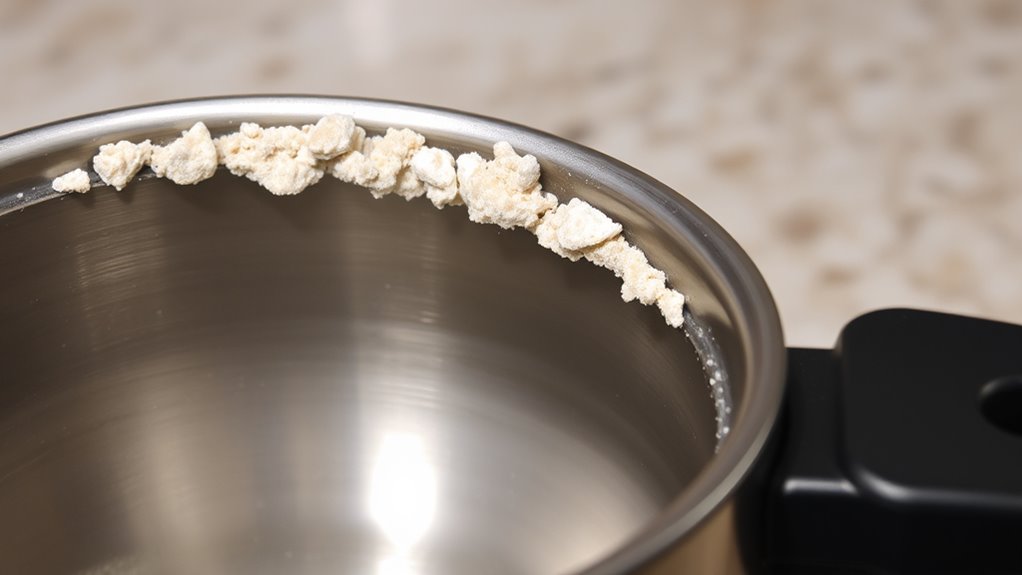
Over time, you might notice your kettle isn’t boiling as quickly as it used to, which is a common sign of scale buildup. Recognizing the signs of scale detection is essential to maintaining your kettle’s efficiency. Buildup indicators often include a limescale film or crust on the interior surfaces, especially around the heating element. You might see white, chalky deposits or cloudy water after boiling. Sometimes, the kettle makes more noise than usual or takes longer to reach boiling point. These are clear clues that mineral deposits are accumulating inside. By paying attention to these buildup indicators, you can catch scale formation early, preventing damage and ensuring your kettle continues to work properly. Regularly checking these signs helps keep your appliance in top shape. Additionally, being aware of the scale buildup process can help you choose the most effective descaling method.
Choosing the Right Descaling Solution for Your Kettle
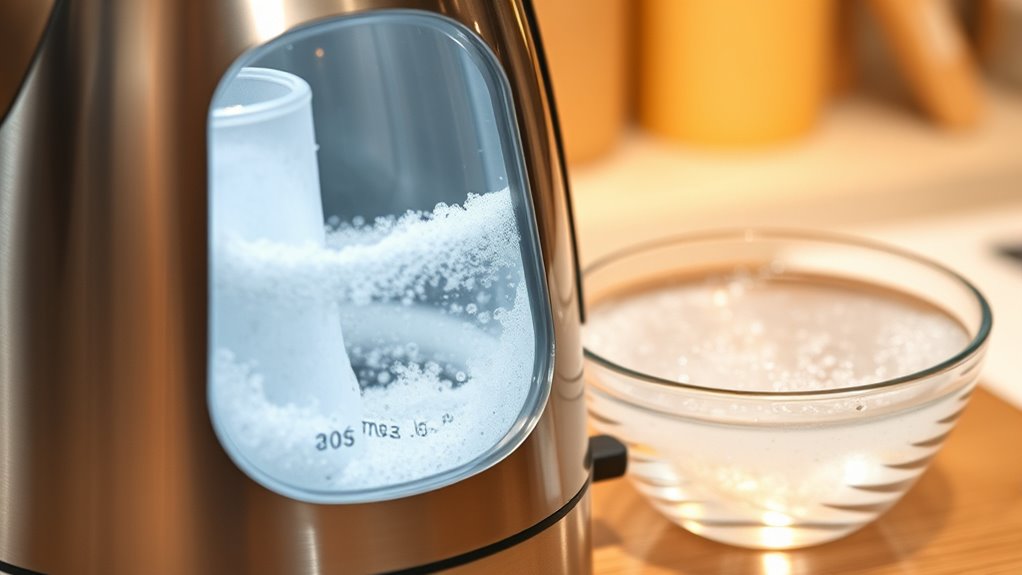
When it’s time to descale your kettle, choosing the right solution can make all the difference. Your water’s hardness level influences your choice—if you have hard water, a more effective descaling method is essential. Water softening agents can help reduce mineral buildup, making descaling easier and extending the time between cleanings. Consider the descaling frequency; if you notice scale buildup quickly, opt for stronger solutions like vinegar, citric acid, or commercial descalers. For softer water, milder options may suffice, reducing potential damage. Always check your kettle’s manufacturer instructions to ensure compatibility. Selecting the right descaling solution not only cleans effectively but also prolongs your kettle’s lifespan, saving you time and money in the long run. Additionally, understanding the contrast ratio of your home cinema projector can help you optimize your viewing experience for better image quality.
The Step-by-Step Descaling Process Using Vinegar or Lemon
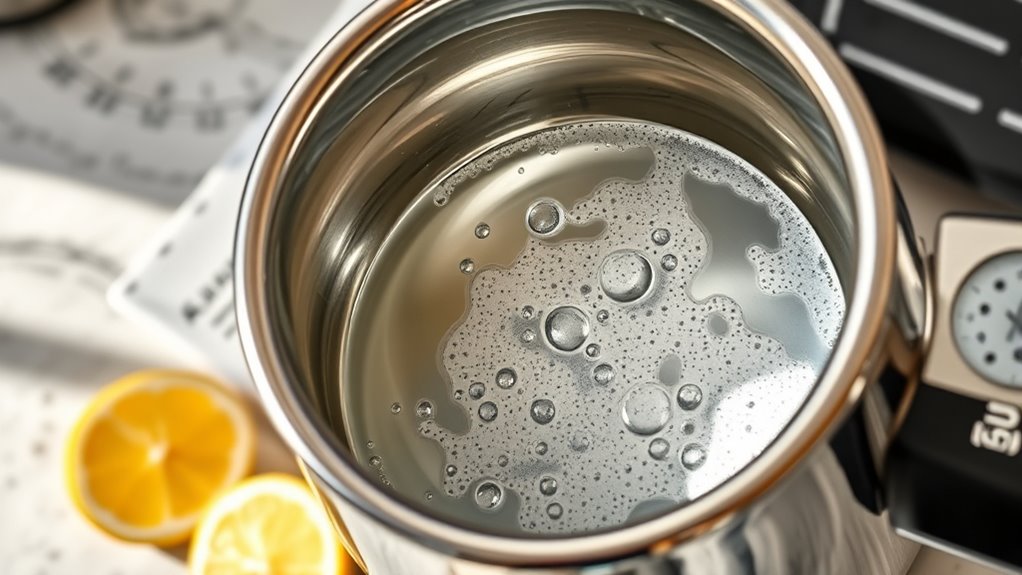
To effectively descale your kettle with vinegar or lemon, start by preparing your chosen solution according to the instructions. Next, boil the solution in the kettle and let it soak for a while to loosen buildup. Finally, rinse thoroughly and polish the inside for a clean, lime-free surface. Using a self-water ing plant pot can help prevent mineral buildup in your kitchen appliances by maintaining proper moisture levels.
Prepare Descaling Solution
Before you start descaling, you need to prepare a suitable solution to break down the mineral buildup. Using vinegar or lemon juice is effective and natural. Mix equal parts water and vinegar or lemon juice to create your descaling solution. This mixture helps loosen limescale and promotes limescale prevention over time. If your water isn’t filtered, mineral deposits are more likely to accumulate, so consider improving your water filtration system to reduce future buildup. The solution should be enough to cover the affected areas inside your kettle. Avoid using harsh chemicals that could damage the kettle’s interior. Once prepared, pour the solution into your kettle and proceed with the descaling process, ensuring you follow the next steps carefully. Proper water filtration can help prevent mineral deposits from forming in the future.
Boil & Soak Solution
Once your descaling solution is in the kettle, turn on the heat and bring it to a gentle boil. This boil & soak step is essential for limescale removal, as the heat helps dissolve mineral deposits. Let the solution simmer for about 15-20 minutes, especially if your kettle is heavily scaled. During this process, the acids in vinegar or lemon work to loosen and break down limescale buildup on the heating element and inside the kettle. Be sure to monitor the process to avoid overboiling or boiling dry. Once the time is up, turn off the heat and allow the solution to soak for a little longer if needed. This step guarantees effective limescale removal, making your kettle easier to rinse and clean. Incorporating natural materials can also help prevent future buildup and keep your kettle in good condition.
Rinse & Polish
After the boiling and soaking process, it’s time to rinse your kettle thoroughly to remove any remaining vinegar or lemon residue. Fill the kettle with fresh water and swirl it around, then pour out the solution. Repeat this process a few times to make certain all cleaning agents are washed away. This step is vital because mineral deposits from water mineralization can build up over time, affecting appliance maintenance and performance. Once rinsed, use a soft cloth or sponge to polish the exterior and interior surfaces, removing any stains or spots caused by mineral buildup. Proper rinsing and polishing help keep your kettle looking clean and functioning efficiently, preventing future scale buildup and making sure better-tasting water every time you boil. Additionally, understanding quorum sensing in bacteria can inspire innovative approaches to maintaining appliance hygiene by exploring microbial interactions that influence biofilm formation on surfaces.
Alternative Methods: Commercial Descalers and Natural Remedies
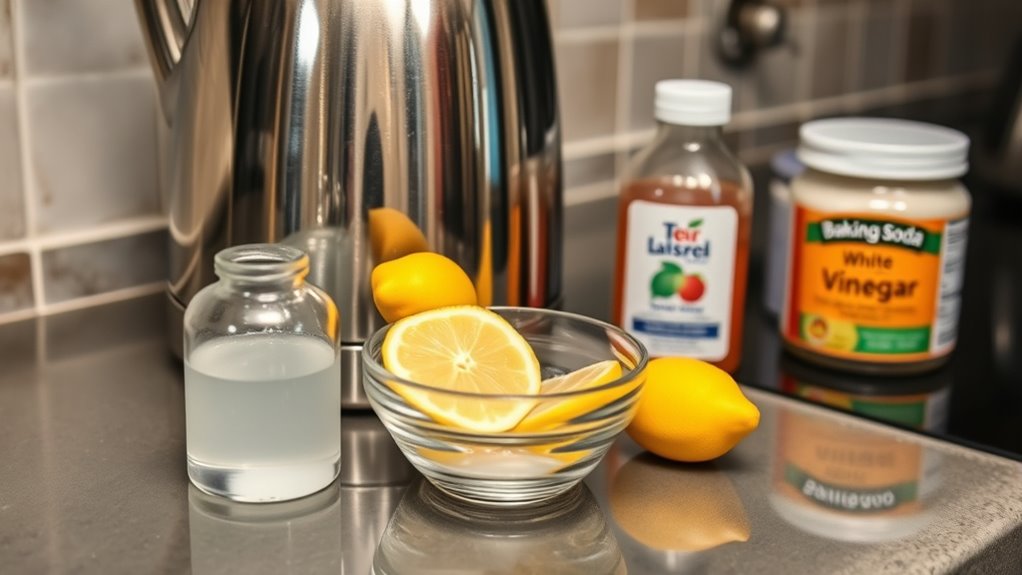
You might consider commercial descalers or natural remedies to clean your kettle, but it’s important to weigh their effectiveness. Commercial products often work quickly, yet natural options can be just as efficient with proper use. Also, think about safety and environmental impact when choosing the best method for your needs. For example, using natural cleaning methods can be safer and more eco-friendly while still effectively removing limescale.
Commercial Descaler Efficacy
Commercial descalers are designed to quickly and effectively break down mineral buildup in kettles, often outperforming natural remedies in strength and speed. Their concentrated formulas target scale removal efficiently, making appliance maintenance simpler and faster. These products are formulated with acids or specialized chemicals that dissolve limescale without requiring prolonged soaking or scrubbing. Because of their potency, commercial descalers are ideal for thoroughly cleaning kettles with heavy mineral deposits, ensuring your appliance functions practically. They save you time and effort while maintaining the longevity of your kettle. However, it’s important to follow manufacturer instructions carefully to prevent damage. Overall, commercial descalers deliver reliable, fast results, making them a popular choice for those seeking effective and hassle-free scale removal. Effective cleaning methods can help prolong the life of your appliance and ensure optimal performance.
Natural Remedies Effectiveness
Are natural remedies effective at removing limescale from your kettle? Many people find herbal infusions, like lemon or vinegar solutions, helpful for tackling buildup. These natural acids break down mineral deposits without harsh chemicals. Using herbal infusions also lets you avoid synthetic cleaners, making your process more eco-friendly. Water filtration systems can assist in reducing future limescale formation by softening water, decreasing mineral content before it enters your kettle. While natural remedies may require a bit more time and repeated applications, they are generally safe and cost-effective. Just be sure to rinse thoroughly after treatment to prevent any lingering flavors. Overall, natural remedies can be quite effective, especially when combined with good water filtration practices.
Safety and Environmental Impact
While natural remedies are generally safe and eco-friendly, it’s important to consider the safety and environmental impact of commercial descalers as well. Many commercial products contain strong chemicals that pose chemical hazards if mishandled or improperly disposed of. These descalers can threaten environmental safety by polluting water sources and harming wildlife. Always follow manufacturer instructions carefully, use protective gear, and ensure proper disposal. Natural remedies like vinegar and lemon are biodegradable and pose minimal risks, making them better for the environment. If you opt for commercial descalers, weigh their effectiveness against potential risks to your health and the environment. Being mindful of chemical hazards and choosing eco-friendly options helps keep your home safe and reduces your ecological footprint. Additionally, selecting vetted products like Mad Tasting can ensure safer and more environmentally responsible descaling.
Tips for Maintaining a Scale-Free Kettle
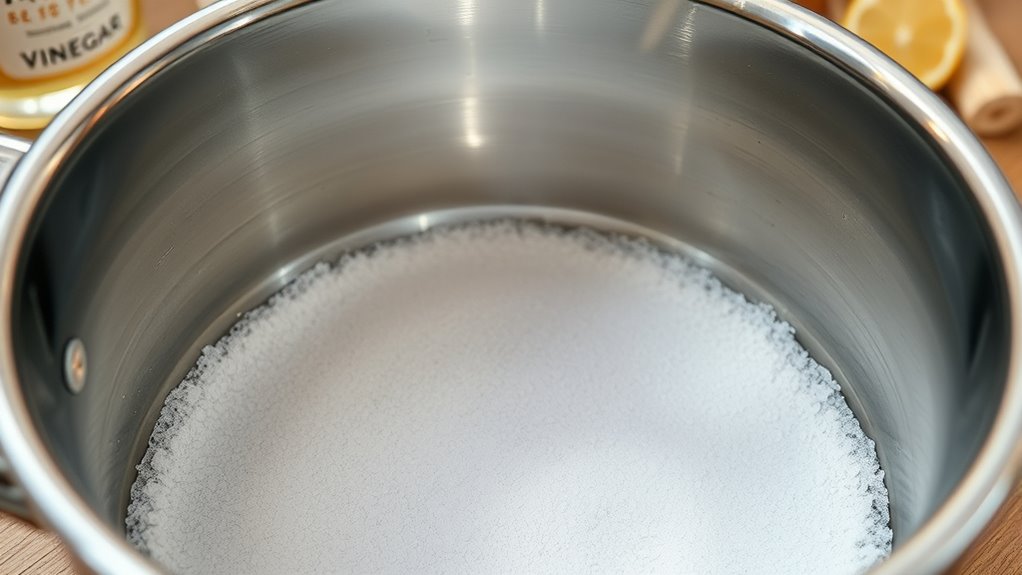
To keep your kettle free of scale buildup, regular maintenance is essential. Water quality plays a significant role; if you live in an area with hard water, consider using a water filter or bottled water to reduce mineral deposits. Consistently emptying and drying your kettle after use helps prevent mineral residue from settling. Regularly inspect the heating element and interior for any signs of scale, and clean them promptly. Proper appliance maintenance also involves avoiding prolonged boiling times and not overfilling the kettle, which can accelerate scale formation. Using descaling solutions periodically, even if you keep up with maintenance, ensures your kettle stays clean and efficient. Additionally, checking for safety standards and proper installation can help prevent potential hazards. These simple steps extend your kettle’s lifespan and improve the taste of your beverages.
How Often Should You Descale Your Kettle?

How often you need to descale your kettle depends on how quickly mineral buildup occurs, which varies based on your water’s hardness. Harder water causes deposits to form faster, so you might need to descale more frequently. Check your manufacturer’s recommendations and monitor mineral levels to keep your kettle in top shape.
Mineral Buildup Timeline
Mineral buildup in your kettle occurs gradually over time, especially if you live in an area with hard water. As you use your kettle, mineral deposits from water start accumulating on the heating element and interior surfaces. Typically, this buildup becomes noticeable after about one to three months of regular use, depending on water hardness. If you don’t perform water softening techniques or descale regularly, these deposits will grow thicker, reducing your kettle’s efficiency. You might notice longer boiling times or a change in taste. To prevent damage and maintain performance, it’s best to descale your kettle every one to three months, especially if you notice signs of mineral buildup. Regular descaling helps keep your kettle clean and prolongs its lifespan.
Hardness Level Impact
The hardness level of your water directly influences how often you need to descale your kettle. Hard water contains higher levels of minerals like calcium and magnesium, which lead to calcium deposits building up faster. Water softening methods can help reduce mineral content, slowing down scaling. If you have hard water, you’ll need to descale more frequently—perhaps every few weeks—since calcium deposits accumulate quickly. Softer water means less mineral buildup, so you can extend the time between descaling sessions. Monitoring your kettle’s performance and inspecting for mineral buildup will help determine the right frequency. Regular descaling prevents long-term damage and keeps your kettle functioning efficiently, regardless of your water’s hardness level.
Manufacturer Recommendations
Manufacturer recommendations provide clear guidance on how often you should descale your kettle, helping you maintain ideal performance. Always check the manufacturer instructions for specific advice tailored to your kettle model, as some brands suggest descaling every month, while others recommend less frequent cleaning. Following these guidelines guarantees you don’t void your warranty, as neglecting proper maintenance might be considered misuse. Regular descaling not only keeps your kettle functioning efficiently but also preserves your warranty considerations, protecting your investment. Keep in mind that water hardness levels in your area can influence how often you need to descale, so adapt your routine accordingly. Ultimately, adhering to the manufacturer’s recommendations is the best way to ensure your kettle remains in top condition.
Common Mistakes That Can Damage Your Appliance
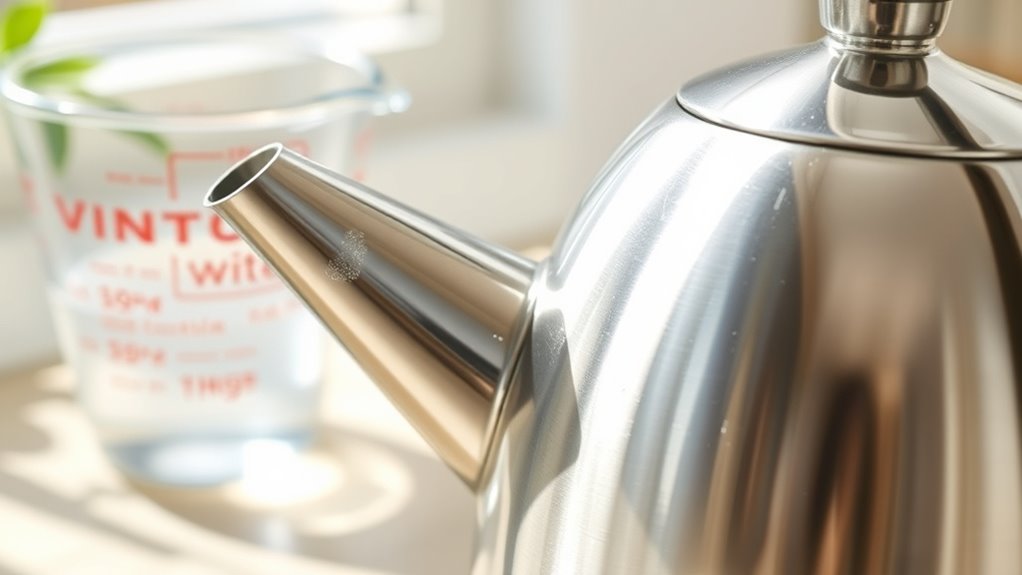
While attempting to descale your kettle, it’s easy to make mistakes that can harm the appliance. Poor water quality can lead to improper scaling removal, risking damage over time. Using harsh chemicals or abrasive tools can scratch or corrode the interior, voiding your appliance warranty. Here are common mistakes to avoid:
Avoid damaging your kettle by using proper descaling methods and good water quality practices.
- Ignoring manufacturer instructions – Using incorrect methods can cause damage.
- Overusing descaling agents – Excessive chemicals may corrode parts.
- Neglecting to rinse thoroughly – Residues can affect water taste and harm components.
- Using hard water regularly – This accelerates limescale buildup, especially if your water quality is poor.
Avoid these pitfalls to preserve your kettle’s lifespan and maintain its warranty. Proper care guarantees efficient performance and longevity.
Preventative Measures to Reduce Limescale Formation
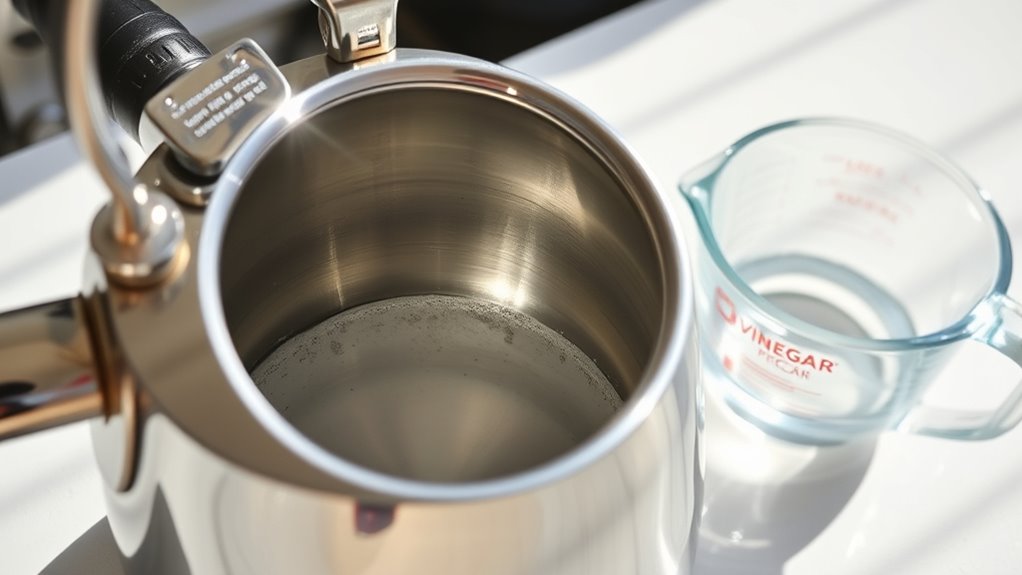
To minimize limescale buildup in your kettle, adopting simple preventative strategies can make a significant difference. One effective method is scale prevention through water softening. Using softened water reduces mineral content, which is the main cause of limescale formation. You can install a water softener or use a descaling filter on your tap, which helps lower calcium and magnesium levels before boiling. Regularly descaling your kettle with natural remedies like vinegar or citric acid also prevents mineral buildup. Additionally, avoid leaving water sitting in the kettle for long periods, as stagnant water encourages limescale deposits. By implementing these measures, you’ll extend your kettle’s lifespan and maintain beneficial performance, all while reducing the need for frequent descaling.
Troubleshooting: When Descaling Isn’t Enough
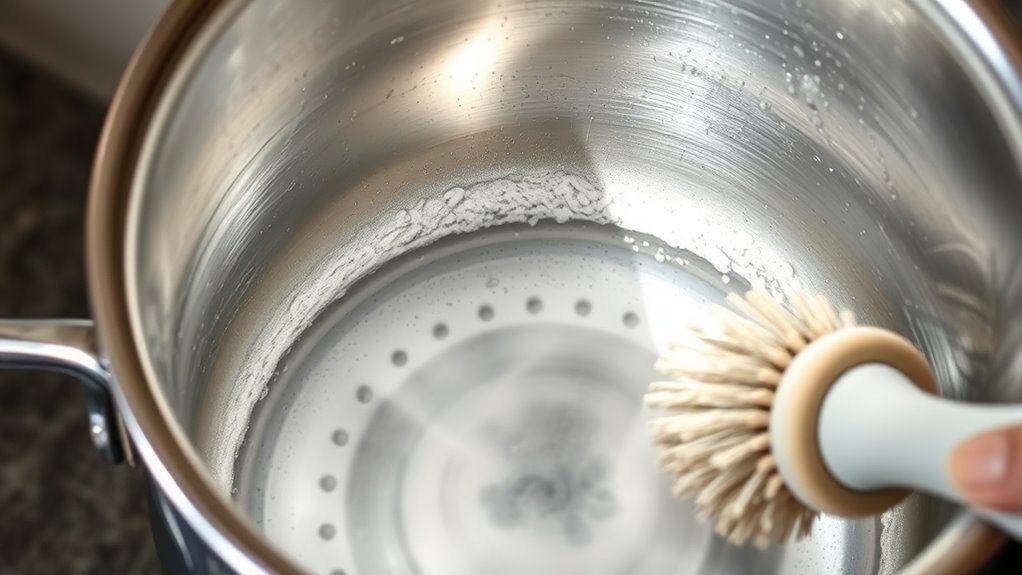
Even with regular descaling, stubborn limescale buildup can persist and interfere with your kettle’s performance. If descaling no longer works, consider these steps:
- Check your water quality; hard water with high mineral content causes more buildup.
- Use a stronger or more frequent descaling solution, especially if mineral deposits are thick.
- Inspect your appliance warranty—if your kettle is still covered, contact the manufacturer for advice or replacement options.
- Consider installing a water softener or using filtered water to reduce future limescale issues.
Persistent buildup may indicate underlying issues, and ignoring them could void your warranty or damage the appliance. Taking these steps helps guarantee your kettle functions properly and lasts longer.
Extending the Lifespan of Your Kettle With Proper Care
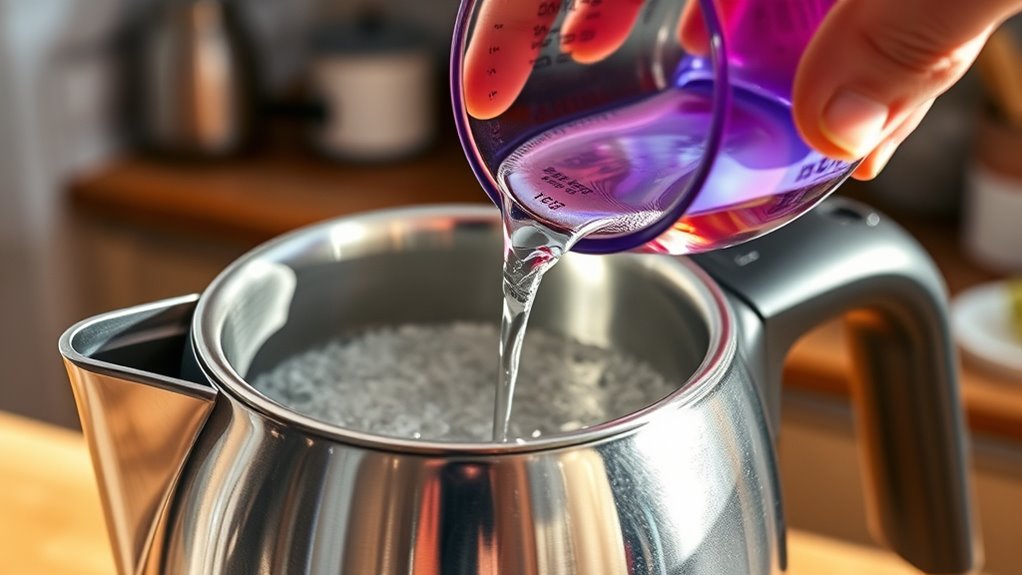
Proper care can considerably extend the lifespan of your kettle, ensuring it performs efficiently for years to come. Start by using filtered water when possible, as high mineral content can cause buildup and reduce your kettle’s efficiency. Regularly descaling helps prevent limescale, which can strain the heating element and void your appliance warranty. Always follow the manufacturer’s instructions for cleaning and maintenance to avoid accidental damage. Keep the exterior clean and dry to prevent corrosion. Avoid overfilling or leaving water inside for extended periods, which can promote mold or mineral deposits. By maintaining good water quality and sticking to proper care routines, you protect your investment and ensure your kettle remains reliable longer. Proper maintenance ultimately saves you money and preserves your appliance warranty.
Frequently Asked Questions
Can Descaling Completely Remove All Mineral Deposits?
Descaling can substantially reduce mineral deposits, but it might not remove every trace of scale, especially in hard-to-reach areas. Over time, stubborn mineral deposits can cling to your kettle’s interior, making complete scale removal challenging. To get the best results, you may need to repeat the descaling process or use a stronger solution. Regular descaling helps prevent buildup and keeps your kettle functioning efficiently.
Is It Safe to Use Vinegar or Lemon Frequently?
Did you know that 80% of people use vinegar or lemon for descaling? It’s generally safe to use vinegar or lemon frequently, but overdoing it might cause damage or affect taste. Vinegar safety depends on dilution; using it occasionally is fine, but daily use could erode your kettle’s lining. Lemon can be used more often, but limiting its frequency helps prevent corrosion, ensuring your kettle stays in good shape.
How Can I Prevent Limescale Formation in Hard Water Areas?
To prevent limescale in hard water areas, you should consider water softening options like installing a water filter or a softening system. Regularly using filtered water reduces mineral buildup, protecting your kettle and appliances. You can also descale frequently with vinegar or lemon, but softening water is the most effective long-term solution. Keep up with these practices, and you’ll minimize limescale formation and extend the lifespan of your appliances.
Are There Eco-Friendly Descaling Options Available?
Yes, eco-friendly descaling options exist, though they often hide in plain sight. You can use biodegradable solutions or eco-friendly acids like citric acid or vinegar, which are gentle on the environment and your kettle. Ironically, these natural options are usually more effective and healthier than chemical cleaners. So, next time you descale, choose eco-friendly acids—you’ll protect your appliance and the planet without sacrificing cleanliness.
What Should I Do if My Kettle Still Scales After Descaling?
If your kettle still scales after descaling, you should revisit your kettle maintenance routine and consider water softening options. Use a stronger or longer vinegar or citric acid solution, ensuring you thoroughly rinse afterward. Installing a water softener or using filtered water can prevent future buildup. Regular maintenance, such as boiling with vinegar monthly, helps keep your kettle scale-free and prolongs its lifespan.
Conclusion
If you master descaling, your kettle will become the superhero of your kitchen, fighting off limescale invaders like a mighty knight! With just a little vinegar or lemon juice, you’ll banish stubborn buildup and keep your appliance running smoother than a racing car. Say goodbye to sluggish boils and hello to a lifetime of perfectly brewed coffee and tea. Descaling isn’t just cleaning; it’s revealing the secret to a legendary, long-lasting kettle!
